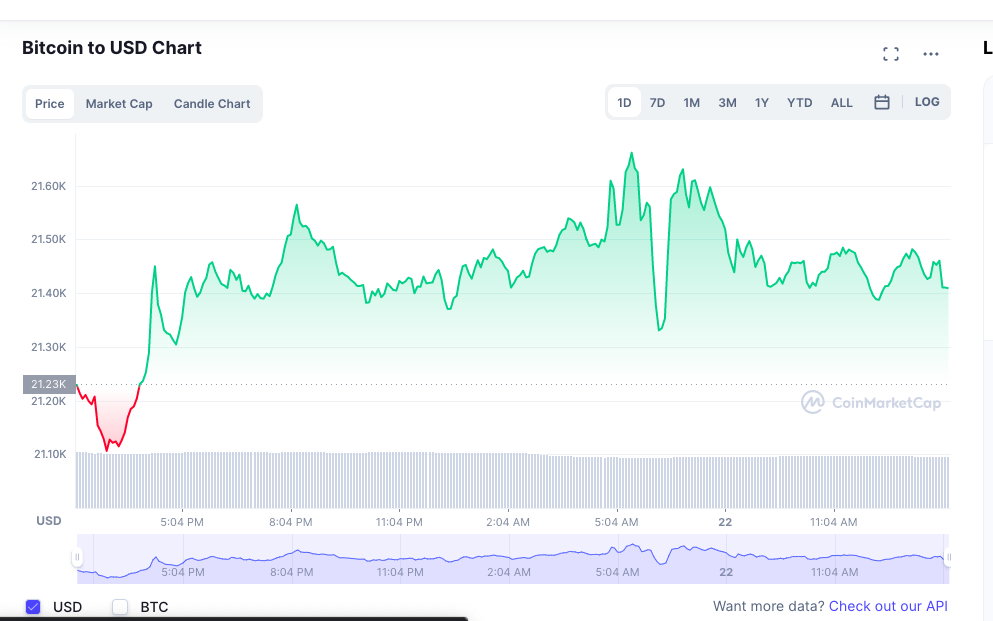Weekend Roundup: Did We Forget About Inflation?
Bitcoin and other cryptocurrencies took a tumble over the weekend, with the world’s largest cryptocurrency currently hovering above US$21,000.
At the time of writing, Bitcoin (BTC) is trading at US$21,425.82 (+1.09)% while Ethereum (ETH) is trading at US$1,597.36 (+1.01%). However, both coins are down 13.48% and 18.54% respectively in the past 7 days. While major altcoins such as Solana (SOL), Avalanche (AVAX), and Polkadot (DOT) have seen slight gains over the weekend, they are also down by more than 20% in the past week.

According to trading firm QCP capital, there wasn’t a specific trigger for the decline in price, but factors including renewed fears of inflation have led to a negative turn in risk sentiment.
Following the release of Germany’s higher-than-expected inflation data, CME FedWatch tool has indicated that the likelihood of the U.S. Federal Reserve raising the federal funds rate by 75 basis points has increased from 41% to 44.5%.
“Fed officials have been actively pushing back on the dovish narrative in the market. This has led to equities stalling and trading lower, yields drifting higher and USD rallying across the board,” the firm said in a note Sunday.
“Chatter about Jump dumping a large amount of ETH ahead of the merge has contributed to the rush to take profit on ETH longs,” it added.
FTX revenue grows by 10X
According to leaked financial documents seen by CNBC, crypto exchange FTX experienced an explosion in revenue in 2021.
At the height of the crypto boom last year, the exchange’s revenue rose more than 1,000% from US$89 million to US$1.02 billion in 2021, while its operating income was US$272 million, up from US$14 million a year earlier. It also recorded a net income of US$388 million last year, up from just US$17 million a year before.
FTX also reportedly made US$270 million in the first quarter of 2022. However, its financials over the current crypto winter has yet to be revealed. The exchange has become something like an emergency lender in recent months, having provided BlockFi with a US$250 million revolving credit facility. FTX has also offered to purchase embattled crypto lender Voyager Digital.
Binance’s Changpeng Zhao learns new word
Binance CEO Changpeng Zhao (CZ) has learnt a new word – “Jitters”.
Taking to Twitter to express his excitement for his new-found vocab, CZ explained that “jitters” can happen when buy orders get “stuck” on crypto exchanges.
Other Twitter users quickly assumed that CZ was referring to Sam Bankman-Fried’s FTX, but the latter replied to the thread, stating that FTX’s order book is “always agnostic to user and never changes order priority”.
Mass liquidation of BAYCs to crash NFT market?
A large number of Bored Apes Yacht Club NFTs are reportedly approaching liquidation on NFT lending platform BendDAO.
BendDAO is an Ethereum-based NFT lending service that lets users borrow Ethereum (ETH) against their NFTs. Its users are able to obtain a loan equal to approximately 35% of the NFT collection’s floor price, or the minimum price to purchase one on the open market, with the NFT pledged as collateral.
In recent weeks, many BAYC holders have borrowed ETH using the BendDAO lending service, and a significant number of these users are at a risk of liquidation due to a decrease in the collection’s floor prices. It’s estimated that 45 of the 272 BAYC NFTs (worth approximately US$5.3 million) within BendDAO are now in the platform’s “danger zone”, which means that they are in danger of getting liquidated.
The 272 BAYC NFTs also represent 2.72% of the entire BAYC NFT collection, which means that there is a theoretical risk of the broader NFT market being affected by the liquidations.
Trading Volume
According to data from CoinMarketCap, the global crypto market cap stands at US$1.02 trillion, a 1.27% since yesterday. The total crypto market volume over the last 24 hours is US$59.33 billion, a 28.59% decrease.
Fear & Greed Index
Risk appetites are sapped – the Crypto Fear and Greed Index currently stands at 29 indicating fear, and down slightly from Friday, when it hit 33. The index uses 5-6 measurements to assess the current sentiment of the market and then rates that level of emotion on a scale of 1-100 – 1 is extreme fear and 100 is extreme greed.
